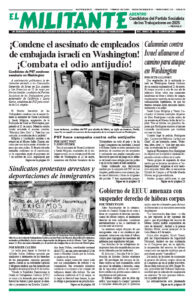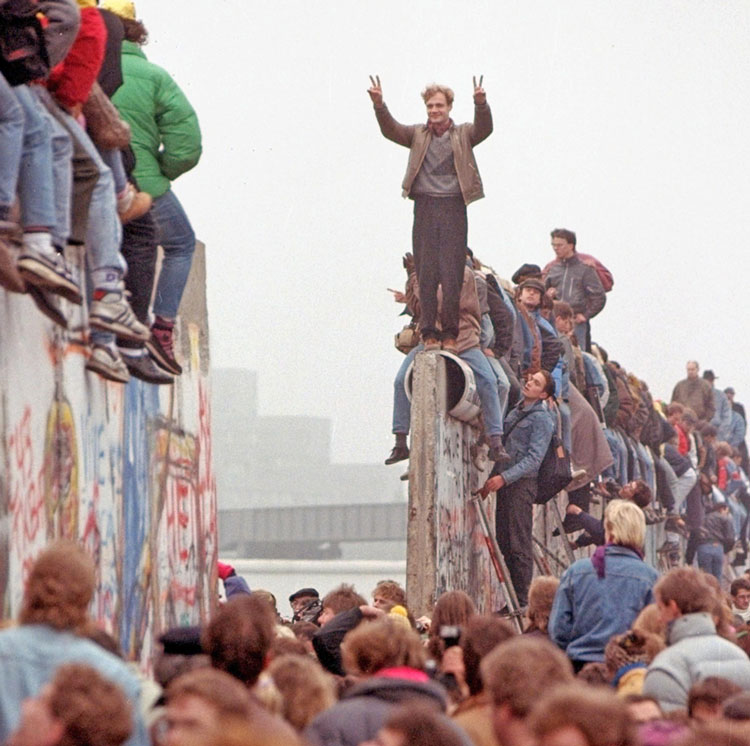This feature is an excerpt from “Ours Is the Epoch of World Revolution,” the introductory article to issue no. 11 of New International. The title article of this issue is “U.S. Imperialism Has Lost the Cold War,” a Socialist Workers Party resolution adopted in 1990. Issues no. 7, 10, 11 and 12 of the New International help explain the historic turning points over decades as the SWP and Communist Leagues responded to the growing crises and spreading wars confronting workers and farmers worldwide. Shifts in world politics are accelerating today as the U.S. rulers and their capitalist rivals rearm and seek new alliances to try to defend their places in imperialism’s growing disorder. Copyright © 1998 by New International. Reprinted by permission.
From New International
AND MARY-ALICE WATERS
[As] “U.S. Imperialism Has Lost the Cold War,” the document featured in this issue of New International, … was being discussed and debated in party branches across the United States and by communist organizations in other countries, the historic events that marked the end of Stalinist regimes across Eastern Europe and the Soviet Union, and the disintegration of the power of the Communist Party apparatuses in those countries, were unfolding day by day. The imperialist rulers had begun to loudly proclaim the defeat of communism and the birth of a “new world order” — even the end of history itself — with themselves supposedly heading toward undisputed control at the world’s helm.
At the very time delegates to the SWP convention were deliberating, the U.S. government opened a drive toward war against Iraq that culminated five months later in six weeks of massive, devastating bombing, a 100-hour invasion of that country, and the slaughter of some 150,000 Iraqi men, women, and children. …
[T]he Socialist Workers Party and chapters of the Young Socialist Alliance, along with communists around the world who shared the political conclusions of that document, turned to the immediate tasks campaigning against the approaching war. U.S. imperialism was to prove unable to achieve its goals in the Iraq war, however. The “grand coalition” engineered under the baton of President George Bush began to come apart even as the guns blazed, obliging the U.S. rulers to stop short of establishing the protectorate they need in that region. The outcome of the Gulf War was among the first striking confirmations of the sharpening interimperialist conflict that would mark the post-Cold War world. …
[O]nly a new interimperialist slaughter, with new powers emerging victorious, can change the balance of forces established with the outcome of the last world war. And such a contest is being prepared.
The real victor in World War II, we should never forget, was not only U.S. finance capital, which emerged largely unchallenged among the imperialist ruling classes. The “American century” remained a sad delusion of Washington liberals, much to their surprise, due to the checkmate imposed by the working class internationally, the other victor in that world conflagration. The toilers’ victory resided in the fact that the dictatorship of the proletariat in the Soviet Union, however weakened and deformed, was not destroyed. The working people of the Soviet Union, at an enormous material and human cost, with the support of workers and farmers worldwide, turned back the imperialist invasion and began to reconstruct. The economic foundations laid by the October 1917 revolution survived. And the oppressed nations and peoples of Asia, Africa, and Latin America seized the moment created by the weakening of the imperialist system to unleash powerful national liberation struggles that changed the face of world politics and the relationship of class forces internationally to the detriment of finance capital.
- The first war on the European continent in almost fifty years had not yet begun in 1990. But for seven years now, since early 1991, it has been sometimes smoldering, sometimes exploding, throughout the lands of Yugoslavia and across the Balkans.
On the blood and bones of the Yugoslav people, the United States government has established itself as the major “European” power. As the rival national capitalist classes of Europe, wrapped in the United Nations flag, wore themselves out in futile attempts to displace one another as the “winner” in the new Balkan wars, Washington unfurled its NATO banner in 1994 and decisively moved in. …
- The growing strains within the reactionary NATO alliance “from intensifying interimperialist competition and shifting alignments” noted in the resolution have sharpened, not diminished. …
The disintegration of the bureaucratic castes, abandoning all pretense to speak for communism or represent the interests of the working class and its allies internationally, has removed an enormous roadblock that for decades stood in the way of revolutionary fighters finding their way to Marxism. Millions were diverted instead onto a course that was in reality a counterrevolutionary negation of what the historic leaders of the modern working-class movement, including Marx, Engels, and Lenin, fought for. …
Gone with the roadblock is also the glue that for decades served to structure the milieu broadly referred to as “the left” throughout the world. Since the Stalinist initiation of the Popular Front “strategy” of class collaboration in the mid-1930s, “the left” has derived its political line and coherency, and often its resources, from identification with and loyalty to the actually existing castes that dominated the workers states. …
This world of the twenty-first century, born prematurely in the closing hours of the twentieth, may be rudely disorienting for many whose lives and consciousness were shaped by the upheaval and consequences of World War II.
For the generation coming to political life today, however, this is the only world they have ever known. For all of us, “U.S. Imperialism Has Lost the Cold War” implies practical tasks and perspectives that fit well today’s growing working-class resistance and put in political relief the forces that will shape the titanic battles that are approaching. Above all, it explains to us why — bourgeois propaganda notwithstanding — the historic odds in favor of the working class internationally have been strengthened, not weakened.


